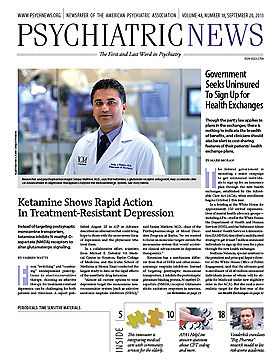I attend the Institute on Psychiatric Services (IPS) every year for a multiple reasons. The IPS provides an ideal venue for networking with like-minded colleagues, especially psychiatrists with a commitment to community, public-sector, and population-based mental health. I have found that such networking is critical to career and leadership development.
In addition to networking with new and long-standing colleagues, the institute also provides a wealth of learning and continuing education that explores the most current thinking in clinical, community, and public psychiatry. For example, the IPS program shows that among the timely topics to be covered are the latest developments in delivery-of-care models, community psychiatry practices and policies, the recovery paradigm, the many varieties of integrated-care programs, approaches to addressing health disparities and promoting social justice, mental illness prevention, and health care reform. All of these topics are crucial to clinical skills enhancement, particularly for community-oriented psychiatrists.
Attending IPS also allows a chance to refreshingly step outside of normal work routines and develop new ideas, learn new approaches, and build new partnerships.
While I must acknowledge that I am a member of the IPS Scientific Program Committee, this year’s IPS—under the leadership of Altha Stewart, M.D., chair of our committee—will undoubtedly be stimulating and memorable. With a theme of “Transforming Psychiatric Practice, Reforming Health Care Delivery,” some of the highlights for me will be the lectures by major thought leaders including, among others, Pamela Hyde, J.D., director of the Substance Abuse and Mental Health Services Administration (SAMHSA); Lisa Dixon, M.D.; M.P.H., Howard Goldman, M.D., Ph.D.; William McFarlane, M.D.; David Pollack, M.D.; and Mark Ragins, M.D. These and the other lecturers—along with a multitude of presenters in courses, forums, innovative program sessions, seminars, symposia, workshops, and posters—make for a very rich IPS experience.
And don’t forget the APA Office of Minority and National Affairs’ popular OMNA on-Tour series, the events sponsored by the American Association of Community Psychiatrists, and the American Psychiatric Publishing bookstore and other exhibits. All told, I am sure that you will discover how the IPS nurtures the continual building of our own community of public and community psychiatrists.
For me, the IPS is one of my chief professional meetings each year. I always learn, reconnect with colleagues, and make new connections. And I always have the chance to get to know yet another great American city in the process. After getting your fill of continuing medical education (and maintenance of certification) credits, gather some colleagues and enjoy a selection of Philadelphia’s great restaurants, historic sites, and diverse and interesting neighborhoods. See you in Philadelphia! ■
